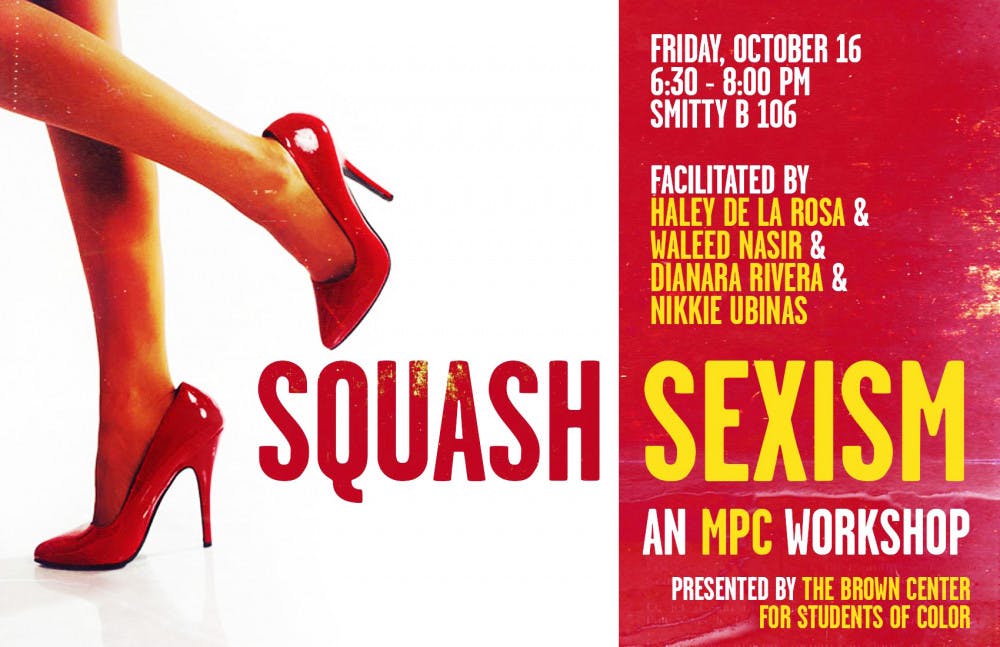Eighty students, family members and faculty members gathered in Smith-Buonanno Hall Friday night to attend a Minority Peer Counselor workshop on the way society discriminates against women.
The workshop, entitled “Squash Sexism,” was facilitated by MPCs Haley De La Rosa ’17, Waleed Nasir ’18, Dianara Rivera ’18 and Nikkie Ubinas ’18.
The facilitators established definitions of key words that would be used throughout the workshop. Rivera defined sexism as “a system of oppression that privileges maleness and masculinity, specifically cisgender men, and disadvantages women and feminine identities.”
Sexism “not only describes prejudice against women and feminine people but also individuals who renounce normative gender roles and identities,” Nasir said.
The workshop also focused on sexism that women of certain racial and gender identities experience, especially black, Latina and transgender women, in relation to lack of access to health care and higher incarceration rates. The slides accompanying the workshop stated that black women are incarcerated at a rate three times higher than white women, and 21 percent of transgender women have been incarcerated in their lifetimes.
Ubinas said the foundation for sexism is patriarchy, which is defined as “a social political system that asserts male dominance and control over women and feminine people.”
“A patriarchal society consists of a power structure that places men at the top of all power hierarchies throughout institutions and individual relationships,” Rivera said.
The patriarchy “directly affects everyone, but in different ways,” and people “internalize sexist ideals” that are established through the patriarchy, De La Rosa said.
Audience members participated in a “patriarchy activity,” in which they raised their hands if they related to certain statements. Statements included “I have assumed that an author of an academic work I was reading was a man,” and, “I’ve felt like I couldn’t go out past sundown alone.” Audience members raised their hands in agreement to both of those statements.
A portion of the workshop was also dedicated to showing how women are represented in the media. A “name the character” activity challenged audience members to guess TV characters based on a listed description. While many audience members believed the descriptions were for characters played by male actors, they were actually for roles played by female actors of color.
After talking about media representation, the facilitators discussed the levels of violence toward those who identity with or express themselves as women in society, especially transgender women. The facilitators recognized street harassment as one of the most common types of violence.
“Street harassment consists of unwanted remarks, gestures or actions forced on strangers that takes place without their consent. It is a form of gender-based violence that includes catcalling and nonconsensual touching,” Rivera said.
As an example of the effects of street harassment, the facilitators discussed the online “What I Wanted to Wear” project, in which people who identified as transgender decided not to wear what they wanted for fear of street harassment and violence. The facilitators also invited attendees to participate in a “gallery walk” by silently reading and reflecting on seven anonymous narratives of street harassment placed around the room.
After the activity, one male audience member asked how he could tackle catcalling despite the “power dynamic” that it creates between the victim and perpetrator. In response, another audience member said that as a man, he would be in a similar position of power as the perpetrator, and he could use that “privilege to manage that situation.”
Rivera ended the workshop by encouraging audience members to join a “community mission” to “uplift and center the voices of women, especially women of color, in their liberation.”
Ubinas told The Herald she was happy that attendees left the workshop with a better understanding of how the patriarchy affects everyone, especially people with certain identities. “It’s important for everyone to consider … that allyship (against sexism) is not a label; it’s not an identity. It’s something that you have to continue working on.”
Nasir, who is from Pakistan, said he learned a lot about sexism in the United States when planning for the workshop.
Sexism “and how it affects people here are very different from home,” Nasir said, adding that he never thought about how sexism could affect access to health care or the way people dress before facilitating the workshop.
De La Rosa told The Herald she believes the facilitators were able to challenge themselves by “continually working towards being more inclusive” through generating discussion around the many ways that people of different identities are affected by sexism.
The workshop facilitators also emphasized how the patriarchy “directly affects everyone, but in different ways” and how people “internalize sexist ideals” that the patriarchy has established, De La Rosa said.
Along with students, some parents visiting for Family Weekend festivities were in attendance.
Frank Karim P’17 said he believed the structure of the workshop was “well thought-out,” and the definitions of the various terms allowed attendees to understand how to participate in the workshop. “At the end of the day, it really brings more insight for everyone who wants to be active in terms of making a difference,” Karim said.
Nadra Karim P’17 said the workshop was “thought-provoking” and “eye-opening.” He praised the “name the character” activity for allowing audience members to understand the “assumptions you make” when hearing certain characteristics.
The workshop was sponsored by the Brown Center for Students of Color as part of the MPC program. Another workshop on heterosexism will take place Tuesday.





